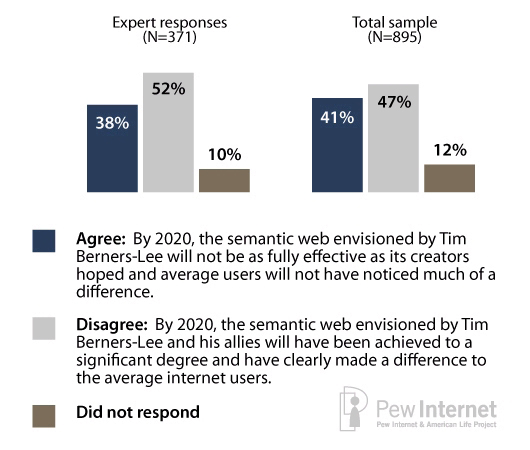Het lot van het semantisch web

Ja, de informatie op het internet zal steeds intuïtiever en gemakkelijker terug te vinden zijn de komende jaren. Of de zich in rap tempo ontwikkelende webtechnologieen ook zullen leiden tot het semantisch web zoals we dat de laatste jaren voorgespiegeld hebben gekregen door internetgoeroes, daar zijn 895 door PEW geinterviewde internetexperts het niet over eens. “Life is messy. So’s the internet,” zegt Jeff Jarvis, een van de geïnterviewde experts. In het rapport ‘The fate of the semantic web’ vind je dus uiteenlopende meningen over de toekomst van het web. De onderzoekers concluderen:
“Too many complicated things have to fall into place for the semantic web to be fully realized. The idea is a noble one and gives the technology community something to shoot for. But there is too much variation among people and cultures and economic competitors to allow for such a grand endeavor to come to fruition.”
Geheugenopfrisvideo
Quotes
David Sifry, de oprichter van blogzoekmachine Technorati.com zegt het zo:
“The key problem with the semantic web is the problem of false data and trust. I think it is a great idea in theory, and many of these principles of the semantic web will be more deeply integrated into the services we use, but an automated web-for-machines that automatically make better decisions for us because of the data they export is a pipedream.”
Axel Bruns, professor Media & Communication, Queensland University of Technology:
“I firmly believe that the web of 2020 will be substantially more semantic than it is toda – but it won’t be the semantic web in the orthodox definition promoted by Berners-Lee et al. The trajectory of recent years (especially with the transition to ‘Web 2.0’) has been one of increased metadata generation, and those data can be harnessed as semantic information, of course – but they will continue to conform to their own, continually emerging and changing schemata rather than to a uniform semantic description language as the semantic web initiative postulates it. This need not make the semantic information available on the web any less useful or effective, however, as the tools for extracting and processing such non-standard metadata from the folksonomic jumble that is the web have also become more and more powerful – but it is a user-generated, semantic web from below rather than a well-ordered, well-structured semantic web from above. It’s the triumph of a Google-style ‘brute processing power’ approach to making sense of the Web over a Yahoo!-style ‘orderly ontologies’ approach, all over again.”

Cijfers
Van de ondervraagden was 47 procent het eens met de volgende stelling. “By 2020, the semantic web envisioned by Tim Berners-Lee will not be as fully effective as its creators hoped and average users will not have noticed much of a difference.” Maar: 41 procent was het eens met onderstaande stelling, met een iets andere strekking: “By 2020, the semantic web envisioned by Tim Berners-Lee and his allies will have been achieved to a significant degree and have clearly made a difference to average internet users.”
Hieronder het volledige rapport op SlideShare, met alle meningen van veel experts over de toekomst van het semantisch web (if any). Hier kun je zelf de pdf vinden.
